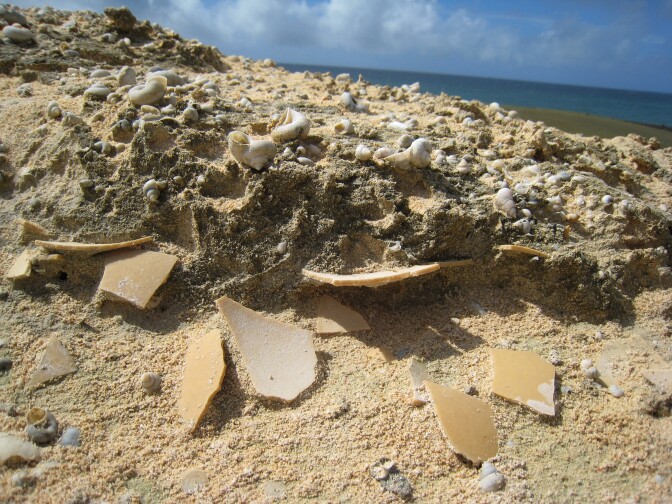Towering around nine feet tall – half of that neck – and weighing in at more than 300 pounds, ostriches are the biggest birds on the planet today.
But there once was an even bigger bird, which roamed Madagascar before dying out roughly 1,000 years ago: the elephant bird.
Scientists don't know much about these massive birds. But a study recently published in Nature Communications has revealed new details about their lives – through a novel analysis of fossilized eggshells.
"[Elephant birds] weigh well over 1,000 pounds ... they lay an egg that's about a foot and a half in length," said Gifford Miller, a professor at University of Colorado, Boulder and one of the co-authors of the study.

The birds once had the ability to fly, Miller said. But when they landed in Madagascar, they likely encountered few predators, evolving into flightless birds and ballooning in size.
"They must have very flexible DNA that allows them to grow big fairly quickly. And they're at a size where they could sort of defend themselves from any natural predator who might be out there," Miller said.
The birds have remained somewhat of a mystery to scientists because there isn't much left of them to study.
"The skeletal fossil record is pretty patchy. There's not a lot of complete bones," said Alicia Grealy, a researcher with Australia's national science agency and another co-author on the study.
So instead of bones, the team analyzed fossilized shards of eggshells, which litter sand dunes and beaches throughout Madagascar today.

"It was pretty exciting," Miller said. "We had a Malagasy guide with us at all times that could help us get around and negotiate with [locals] to get permission to be on the land, and then to wander around and find these."
"The eggshells look like pottery. They're so strong – they're not at all fragile."
The shells have preserved the bird's DNA, as well as "stable isotopes," atomic signatures that the researchers used to study the birds' diets.
Miller and Grealy's team found preliminary evidence for a previously unknown lineage of the birds in northern Madagascar.
"That was kind of surprising, because no skeletons have ever been found there," Grealy said.
As for what happened to the elephant birds?
The scientists say no one knows exactly why they disappeared. But they did vanish sometime after the first humans arrived on Madagascar, suggesting some combination of hunting and habitat change might have made humans a predator that even elephant birds were unable to match.
Copyright 2023 NPR. To see more, visit https://www.npr.org. 9(MDA1OTI3MjQ5MDEyODUwMTE2MzM1YzNmZA004))









